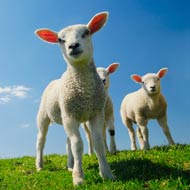NSA backs Scottish Natural Heritage raven cull

The licences will allow local estates to cull more than 60 non-breeding ravens per year over five years.
The National Sheep Association (NSA) has backed a decision by Scottish Natural Heritage to cull ravens in an effort to reduce the number of lamb attacks.
NSA chief executive Phil Stocker said that responsible culling under license will allow sheep farmers ‘to keep on top of the numbers and protect stock when they are at their most defenceless’.
The NSA also called for licenses to be readily available to other parts of the UK affected by the massive increase in raven numbers.
“NSA has received reports of very high losses to ravens this year, including flocks in Scotland where 50 to 100 lambs have been killed,” said Mr Stocker. “Ravens target lambs in vulnerable moments, even striking the very moment they are born, and the loss of a tongue or an eye is a terrible way for these young animals to die."
Scottish Natural Heritage has come under fire for its decision to grant licences to allow raven numbers to be responsibly reduced. The licences will allow local estates to cull more than 60 non-breeding ravens per year over five years in the Strathbraan area of Perthshire.
A number of animal welfare charities have expressed their concern over the cull, including RSPB Scotland and Animal Aid. As of Friday 25 May, just under 118,000 people had signed a petition calling on the SNH to change its mind.
Speaking out on the debate, NSA Scottish regional chairman John Fyall said: "It is an emotive issue for campaigners, but nothing is as emotive as seeing a newborn lamb trying to find a teat to feed from its mother with no tongue and no eyes.”



 The Federation of Independent Veterinary Practices (FIVP) has announced a third season of its podcast, Practice Matters.
The Federation of Independent Veterinary Practices (FIVP) has announced a third season of its podcast, Practice Matters.